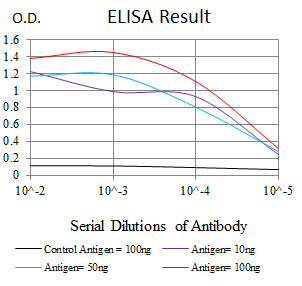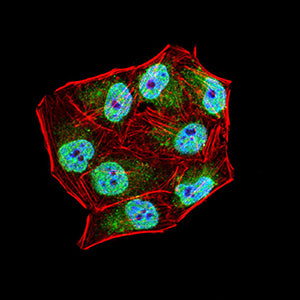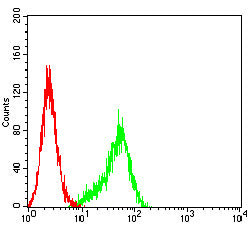


| WB | 咨询技术 | Human,Mouse,Rat |
| IF | 咨询技术 | Human,Mouse,Rat |
| IHC | 咨询技术 | Human,Mouse,Rat |
| ICC | 1/200 - 1/1000 | Human,Mouse,Rat |
| FCM | 1/200 - 1/400 | Human,Mouse,Rat |
| Elisa | 1/10000 | Human,Mouse,Rat |
| Aliases | TNFSF14; LTg; HVEML; LIGHT |
| Entrez GeneID | 8740 |
| clone | 1F4A5 |
| WB Predicted band size | 26.3kDa |
| Host/Isotype | Mouse IgG2a |
| Antibody Type | Primary antibody |
| Storage | Store at 4°C short term. Aliquot and store at -20°C long term. Avoid freeze/thaw cycles. |
| Species Reactivity | Human |
| Immunogen | Purified recombinant fragment of human CD258 (AA: extra 59-240) expressed in E. Coli. |
| Formulation | Purified antibody in PBS with 0.05% sodium azide |
+ +
以下是关于CD258(LIGHT/TNFSF14)抗体的3篇参考文献及其摘要概括:
1. **文献名称**:*Targeting the LIGHT-HVEM Pathway in Autoimmunity and Cancer*
**作者**:Ware CF, et al.
**摘要**:探讨LIGHT(CD258)与其受体HVEM/LTβR的相互作用在调节T细胞免疫中的作用,提出抗LIGHT抗体可通过抑制异常免疫激活,用于治疗自身免疫性疾病(如红斑狼疮)和增强抗肿瘤免疫反应。
2. **文献名称**:*Anti-LIGHT mAb Therapy Reduces Inflammatory Responses in Murine Collagen-Induced Arthritis*
**作者**:Wang Y, et al.
**摘要**:研究显示,阻断LIGHT的单克隆抗体可显著减轻胶原诱导的关节炎小鼠模型的关节炎症和骨质破坏,提示其作为类风湿性关节炎的潜在治疗策略。
3. **文献名称**:*LIGHT/TNFSF14 Promotes Immunosuppression in the Tumor Microenvironment via T Regulatory Cell Expansion*
**作者**:Tamada K, et al.
**摘要**:揭示LIGHT在肿瘤微环境中通过扩增调节性T细胞(Tregs)介导免疫抑制,使用抗CD258抗体阻断该通路可增强抗肿瘤免疫,抑制黑色素瘤和结直肠癌模型中的肿瘤进展。
以上文献涵盖CD258抗体在自身免疫病、肿瘤治疗中的机制与应用,反映其作为免疫调节靶点的潜力。
CD258. also known as LIGHT (homologous to lymphotoxins, exhibits inducible expression, and competes with HSV glycoprotein D for HVEM, a receptor expressed by T cells), is a member of the tumor necrosis factor (TNF) superfamily. It is encoded by the TNFSF14 gene and functions as a type II transmembrane protein, primarily expressed on immune cells such as activated T cells, dendritic cells, and natural killer cells. LIGHT interacts with two receptors: herpesvirus entry mediator (HVEM/TR2) and lymphotoxin β receptor (LTβR), as well as a soluble decoy receptor, decoy receptor 3 (DcR3), which modulates its activity. These interactions regulate immune responses, including T-cell activation, inflammation, and lymphoid tissue development.
CD258 antibodies target LIGHT and are studied for their therapeutic potential in immune-related diseases. In cancer, LIGHT promotes anti-tumor immunity by enhancing T-cell responses, making agonist antibodies a candidate for immunotherapy. Conversely, in autoimmune disorders (e.g., rheumatoid arthritis, inflammatory bowel disease), LIGHT overexpression contributes to pathological inflammation, prompting the development of neutralizing antibodies to block its pro-inflammatory signaling. CD258 antibodies are also explored in infectious diseases and transplant rejection. Preclinical studies highlight their dual role in either stimulating or dampening immune activity, depending on disease context. Ongoing research focuses on optimizing antibody specificity and delivery to balance efficacy with safety, positioning CD258 as a versatile target in immune modulation.
×